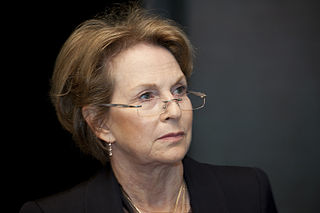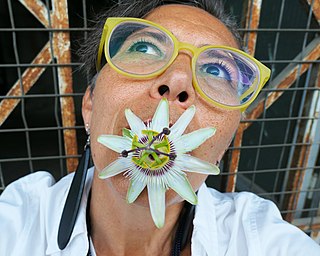Isabel Czerwenka-Wenkstetten (born 1969) is a contemporary Austrian visual artist.
Isabel Czerwenka-Wenkstetten (born 1969) is a contemporary Austrian visual artist.
Czerwenka-Wenkstetten was educated in London and Vienna, and is noted for the influence of her natural sciences background on her art, which explores (according to her artist's statement) "inner, exterior, and in-between spaces and limits, boundaries, as well as different structures, grown or man-made, which mirror the patriarchal approaches we have slowly grown out of over the past century." [1] Her art incorporates multiple textures and materials, including mirrors, glass, metalware and silicone, and analog and digital photographs. She has organized art projects in Austria, Germany, Poland, India, Nigeria, UK, United States, Iceland and Palestine. Czerwenka-Wenkstetten is a member of Emergence of Projects (eop), a transdisciplinary network of artists, a founding member of the "Fishpool Aquarium for Art and Social Affairs" in Vienna, and is listed in the Elizabeth A. Sackler Center for Feminist Art's Feminist Art Base.

Judy Chicago is an American feminist artist, art educator, and writer known for her large collaborative art installation pieces about birth and creation images, which examine the role of women in history and culture. During the 1970s, Chicago founded the first feminist art program in the United States at California State University, Fresno which acted as a catalyst for feminist art and art education during the 1970s. Her inclusion in hundreds of publications in various areas of the world showcases her influence in the worldwide art community. Additionally, many of her books have been published in other countries, making her work more accessible to international readers. Chicago's work incorporates a variety of artistic skills, such as needlework, counterbalanced with skills such as welding and pyrotechnics. Chicago's most well known work is The Dinner Party, which is permanently installed in the Elizabeth A. Sackler Center for Feminist Art at the Brooklyn Museum. The Dinner Party celebrates the accomplishments of women throughout history and is widely regarded as the first epic feminist artwork. Other notable art projects by Chicago include International Honor Quilt, The Birth Project, Powerplay, and The Holocaust Project. She is represented by Jessica Silverman gallery and Salon 94 gallery.

The Dinner Party is an installation artwork by feminist artist Judy Chicago. Widely regarded as the first epic feminist artwork, it functions as a symbolic history of women in civilization. There are 39 elaborate place settings on a triangular table for 39 mythical and historical famous women. Sacajawea, Sojourner Truth, Eleanor of Aquitaine, Empress Theodora of Byzantium, Virginia Woolf, Susan B. Anthony, and Georgia O'Keeffe are among the symbolic guests.

Valie Export is an avant-garde Austrian artist. She is best known for provocative public performances and expanded cinema work. Her artistic work also includes video installations, computer animations, photography, sculpture and publications covering contemporary art.

Feminist art is a category of art associated with the late 1960s and 1970s feminist movement. Feminist art highlights the societal and political differences women experience in their lives. The hopeful gain from this form of art is to bring a positive and understanding change to the world, in hope to lead to equality or liberation. Media used range from traditional art forms such as painting to more unorthodox methods such as performance art, conceptual art, body art, craftivism, video, film, and fiber art. Feminist art has served as an innovative driving force towards expanding the definition of art through the incorporation of new media and a new perspective.

The Elizabeth A. Sackler Center for Feminist Art is located on the fourth floor of the Brooklyn Museum, New York City, United States. Since 2007 it has been the home of Judy Chicago's 1979 installation, The Dinner Party. The Center's namesake and founder, Elizabeth A. Sackler, is a philanthropist, art collector, and member of the Sackler family.

Karin Hannak, is an Austrian artist. Her work includes capillographic, photographic, installation, video and conceptual art.
Miriam Schaer is an American artist who creates artists' books, and installations, prints, collage, photography, and video in relation to artists' books. She also is a teacher of the subject.
Amy Jenkins is an American artist from Peterborough, New Hampshire who is recognized for her work in video installation and experimental film.

Elizabeth Ann Sackler is a public historian, arts activist, and the daughter of Arthur M. Sackler; as such, she is a member of the Sackler family. She is the founder of the American Indian Ritual Object Repatriation Foundation and the Elizabeth A. Sackler Center for Feminist Art at the Brooklyn Museum.
Tomoko Sawada is a Japanese contemporary feminist photographer and performance artist. She has been included in numerous group shows in Japan, Europe and the US. Her first solo exhibition was in 1997 at Japan's Gallery Chat. In 2004 she was awarded the prestigious Kimura Ihei Memorial Photography Award for Young Japanese Photographer as well as the International Center of Photography Infinity Award in the category of Young Photographer.

Blanka Amezkua is a Mexican-American Latinx inter-disciplinary contemporary artist. Collaboration, radical pedagogy, and community building are central to her art making and projects. Formally trained as a painter, her creative practice is greatly influenced and informed by folk art and popular culture, from papel picado to comic books.
Karen Heagle is an American artist, known for autobiographical and art historical subject matter. Her work comments on contemporary culture through a queer perspective with a focus on feminist agendas.
Diana Kurz is an Austrian-born feminist painter who is known for her Remembrance (Holocaust) series, which explores the "loss and preservation" of the artist’s family members during the Holocaust.

Boryana Rossa is a Bulgarian interdisciplinary artist and curator making performance art, video and photographic work.
Sanghee Song is a South Korean artist. Sanghee Song was born in Seoul in 1970. She attended Ewha Womans University, earning her BFA in painting in 1992 and her MFA in 1994. Her works challenge the myths and repetitive narrativity of virtuous women. For her 2004 video The National Theater, Song reenacted the assassination of Yuk Young-soo, wife of South Korean president Park Chung-hee.
Jennifer Nehrbass is an Albuquerque-based mixed media artist, with a focus on collage and painting.

Oskar Czerwenka was an Austrian operatic bass and academic teacher. He was a member of the Vienna State Opera from 1951 to 1986, performing 75 roles, including his signature role Ochs auf Lerchenau and premieres of new operas. He was also an author, visual artist and illustrator, and performed in concert. He received several awards, and the state music school in his home town was named after him.
Czerwenka is a surname, a Germanized version of the Czech surname Červenka. Notable people with the surname include:

Katharina Cibulka is an Austrian feminist artist, filmmaker and photographer whose work addresses gender-based inequity and power structures through public art projects such as her series of installations "SOLANGE". For her SOLANGE installations, Cibulka covers scaffolding at construction sites with monumental cross-stitch messages in bright pink tulle on white mesh fabric, following the pattern "As long as ... I will be a feminist." At least 27 SOLANGE installations have appeared in at least 21 cities, in countries including Austria, Slovenia, Morocco, Germany, and the United States. In 2021, Cibulka received the Tyrolean Prize for Contemporary Art from the State of Tyrol.